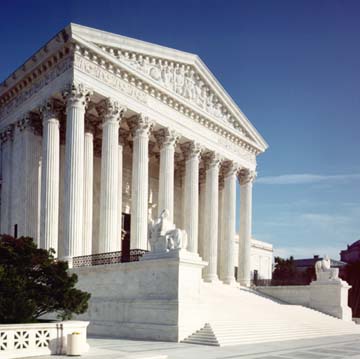To Kill Or Not To Kill: That Is The Question
.
 In a 5-4 decision, the Supreme Court of the United States declared the execution of criminal juveniles unconstitutional this last Tuesday. This decision is apparently drawing the wrath of some conservative pundits who have recently declared war on the Supreme Court calling it everything from tyrannical to incompetent. It is odd that these conservative voices are professing love for human life by condemning abortion but are ready to zap people in execution chambers. Strangely enough, this contradiction goes the other way in Europe where abortion is acceptable but the death penalty is not.
In a 5-4 decision, the Supreme Court of the United States declared the execution of criminal juveniles unconstitutional this last Tuesday. This decision is apparently drawing the wrath of some conservative pundits who have recently declared war on the Supreme Court calling it everything from tyrannical to incompetent. It is odd that these conservative voices are professing love for human life by condemning abortion but are ready to zap people in execution chambers. Strangely enough, this contradiction goes the other way in Europe where abortion is acceptable but the death penalty is not.The conservative commentator George Will wrote a column in the Washington Post today attacking Justice Kennedy on this latest court decision. Although he mentioned in passing that Justices Breyer, Ginsburg, Souter and Stevens have also joined the prevailing opinion, his target du jour was Justice Kennedy. George Will was apparently offended by Justice Kennedy’s explanation that “the nation's ‘evolving standards of decency’ now rank such executions as cruel and unusual”. Mr. Will projects what is a perfect stand by a perfect traditionalist who can not accept that societal ethics are dynamic in nature and, thus, evolve. He seems to forget that at one time segregation was defended and legislated on the basis of constitutional interpretation. He may have forgotten that the constitution at one time treated non-propertied men, women, and Blacks as inferior citizens by limiting their rights and participation in society. That changed of course because enlightened minds sought to rectify the wrongs of their times, as their standards of decency evolved, by passing amendments and giving new meaning to the constitution. Therefore, Justice Kennedy is not mistaken when he asserts that the country’s standards of decency evolve with time, hence, the need for a constant state of debate and pondering. Otherwise we can just read from the texts of those who came before us and continue to perpetuate their wrongs regardless of the realities we now live or the ethics we now espouse to.
No wisdom and no text are so sacred that they can not be re-thought and eventually altered. I shiver at the thought that we should do things just because someone said so a long time ago. That is certainly not the spirit that brought this nation into being. If it were so, the founders could have just modeled American democracy on European aristocracy. But they were better than that. They certainly recognized that they had an independent intellectual capacity to use in pondering the questions of their time within the contextual realities of their environment. They were brilliant because first and foremost they rejected intellectual laziness and embraced the insights of such greats as Thomas Hobbes and John Locke. Before they passed, they also told us that their logic was indeed a starting point, not the final destination, for the creation of a better, more righteous society. They would be stunned if they were to return to find us obsessing about their every word as opposed to being inspired by their wisdom. The genius is not in the words, George, it is in the application of knowledge for the advancement and betterment of society.
What we are told in every critical opinion directed at the court nowadays is that judges are now assuming a public policy role or 'legislating from the bench'. May we be reminded that the end of segregation was triggered by the bench, not congress and certainly not the segregationist state capitols of the time (Brown vs. Board of Education in 1954). I doubt that anyone would venture to call that decision a case of 'legislating from the bench'. The court plays its intended role by making rulings that generate public debate and spur new legislation when the legislative branch has been inept or slow in addressing social ills. This is not new although we are now urged to believe otherwise.
Nonetheless, a debate on the role of judges in the public policy process is warranted. I do not advocate that such debate is without substance for even the 'Men in Black' need to be reminded of their constitutional limits. This is a discussion that must continue even if it were to lead to a potential reform of the Judiciary. As I said earlier, nothing is so sacred as to escape the test of time. But let us at least recognize that we do not live the lives of those who came before us and as such we may not always find all of their deeds to be appropriate for our times.
The death penalty is neither an effective tool of judicial punishment nor is it something I find to be morally defensible today. If we are the true advocates that we claim to be for mankind, then we ought to walk the talk even when it comes to those in our midst who defile the value of human life. I disagree with the dissenting voices condemning this recent Supreme Court decision. I believe that the court actually got this one right, although I would rather welcome a complete ban on the death penalty all together.
See Also Previous Posts:
.


























3 Comments:
I don't think it's strange to be in favor of death penalty but to be opposed to abortions. One may view (late-term) abortions as the ending of an innocent life, which is unable to defend itself. On the other hand, people who receive death penalty are murderers of the most brutal kind. Why should they be allowed to live for years, even decades, whereas their victims' lives are prematurely and tragically ended?
My major problem with the Supreme Court decision is their use of foreign law to deem what's cruel and unusual. In other words, they decide what's unusual not on the basis of true morality but on whether other people do it or not. That is a faulty argument, and can lead to unjust decisions... including support of segregation if other countries were to start applying it for some reason.
March 07, 2005
I think that you have a legitimate concern regarding the use of foreign law as a source for making decisions on constitutional matters. There was a very interesting debate regarding this issue between Justices Antonin Scalia and Stephen Breyer at American University recently. I think that's a very good debate to have. But one can not approach it from purely a nationalistic viewpoint. Maybe we can expand on this discussion on your blog and get some more people involved in it.
Regarding the death penalty. I think it is easy to commit violence especially when we can justify it to ourselves (Your 'Evil vs. Evil' Post gives some very good insights on that). It is much harder to defend the principle of human life even when it benefits those who commit evil. The biggest challenge is obviously giving closure to the victims' families as you mentioned. That's a hard one. Something I wouldn't want to minimize in any discussion.
March 07, 2005
Very interesting points that you've made. I'll try to generate a discussion in my next few entries in connection with the conference I attended.
March 07, 2005
Post a Comment
<< Home